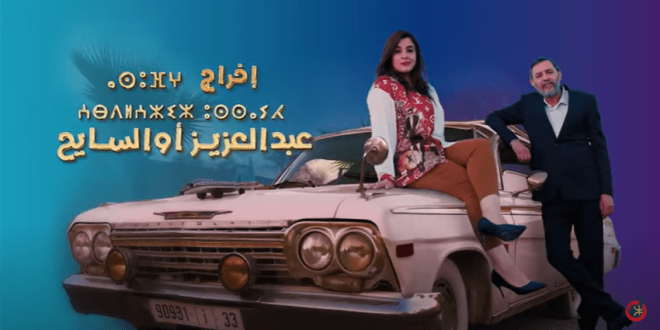The “Hors-jeu” series treats the “age difference between the spouses” with “satirical comedy.”

The “Eighth” Amazigh channel is showing, during the current month of Ramadan, the Amazigh comedy series “Hors-jeu”, directed by Abdel Aziz or Al-Sayeh and screenplayed by Ali Al-Dah, with the participation of a group of Amazigh actors, such as Abdel-Latif Atef, Noura Al-Waliti in the title role, with the participation of Al-Hussein. Bardawez, Ahmed Aweinti, Hamid Ashtouk, Fatima Al-Sousi, Khadouj Andam, Hassan Sarhan, Khadija Amzian, Hassan Aliwi… and produced by “Masilia”.
The series, which deals with the age difference between the spouses in a satirical comic form, deals with the diaries of “Al-Bashir”, a man in his sixth decade of life, who married “Rabia” in her third decade of life, after failing three previous times due to his inability to have children from the three previous wives.
The comic series “Hors-jeu” derives its central idea from the core of the Moroccan reality, where “we find in some marital relations a kind of disparity at the level of age or life experiences, and this disparity may cast a shadow on the reality of the spouses, which makes us face many dramatic situations that can be Investing in it, whether in the tragic or comic part.
According to the scriptwriter, Ali Al-Dah, “Or Jo” monitors many comic situations resulting from this disparity. The idea of the comedy series “Or Jo” is summed up in the story of “Al-Bashir”, a retired man who decided to marry “Rabia”, who is a few years younger than him, after his marriages failed. The previous three are the result of childlessness. The events of the series take place in the estate owned by Al-Bashir, in which he decided to reside and leave the city in search of peace and quiet. The age difference between the spouses increases the complexity of the relationship between them. Moroccan society, in a comic form, adopts situational comedy as the best form of laughter.

The comic series, according to Dah, falls within the category of dramas of a light and short nature in terms of the time of the episodes and the number of scenes. From here, “we can say that the general event that the story presents is the diary of “Al-Bashir”, a man in his sixties who married Rabia. “In the third decade of her life, this marriage of his came after he failed in three previous marriages. Of course, this failure was caused by the president, which is mainly represented in his inability to have children from the three previous wives. Al-Bashir’s insistence on marrying in this way is motivated by the life of prosperity that he lives in his private estate.” .
The story begins with their departure to the desert, and exactly to the estate, which Al-Bashir makes as his quiet haven when the means of life in the city become narrow. Al-Bashir and his wife, Rabia, settle in the estate, although she does not accept the idea in the first place, but she supports the desire of her husband, who has a complex personality. The couple's diaries are dictated by their life together, which is often characterized by disagreement. And the incompatibility resulting from the disparity in age between them. Rabia is still a young woman who dreams, as young women of her age dream, of a more soft and romantic husband, but her bad luck threw her to a husband who no longer cares about life except his estate, his unique car, and his old friend, the sparrow “Dawood”.
The lack of a sequence of episodes in terms of the idea or the event, made the scriptwriter confine himself in the general perception of the series to the central and basic edge of the story, which is the migration of Al-Bashir and his young wife Rabia from the city towards the estate that he owns on the outskirts of the city and their diaries there, and the conflicts and differences imposed by their married life that are of a comical nature. And the episodes come independently in terms of the idea, the event, and even the secondary characters that contribute to making the event in the subject of the episode.
Regarding the style of writing the series, the scriptwriter says, “The life transformations facing the Moroccan person in many fields necessitate the tactful comedian writer renewing his vision and tools away from clowning and free laughter. Community issues are presented in a humorous artistic format, a risqué comedy, and exercise the right to criticize reality with tact and a refined artistic sense.” On which we rely in building the comic plot of the series.”

The speaker added, “The obsession with the timing of the episodes imposes on us a kind of care in selecting topics and ideas related to the general idea, in addition to accuracy in dealing with the situation that is the subject of the episode with a number of scenes not exceeding 7 focused scenes in terms of dialogue and comic sentences, while exploiting all the spaces and decorations approved in the series with Our focus is on visual aesthetics that complement the scenario, such as decoration, clothing, and the style of each individual character.”
Montassir éthéré

